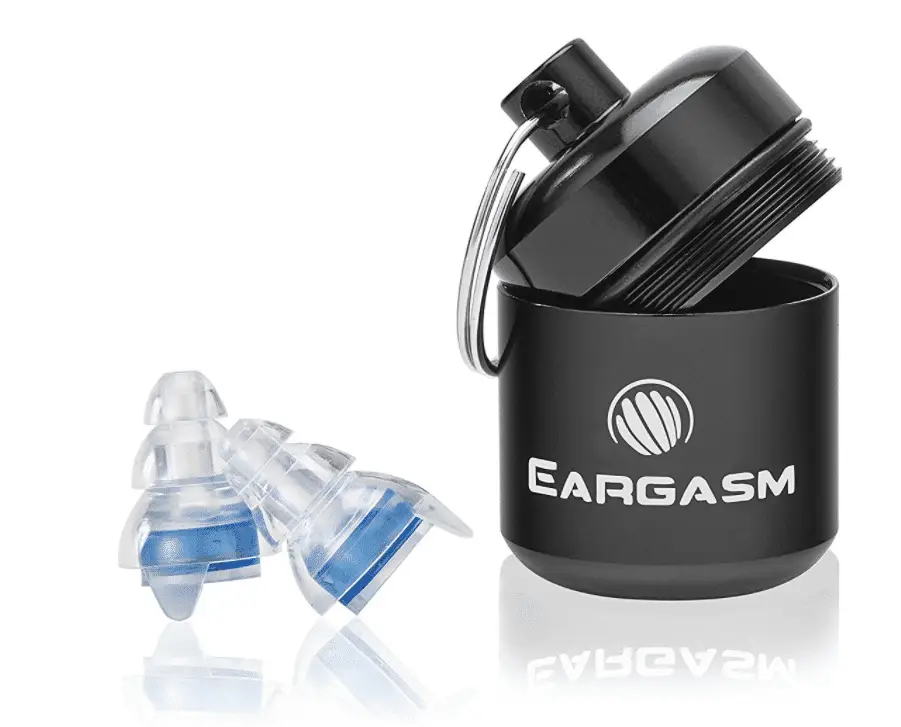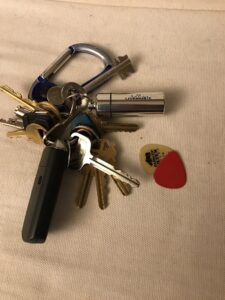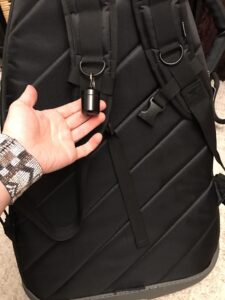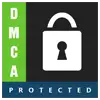Musician: If you are planning to make music for a long time, and hear the voices of the ones you love… please take heart and a set of earplugs. Your hearing is too important to toy with.
Did you know that…
Inside our ears live tiny hair cells. They are part of a truly miraculous machinery involving small bones, membranes, fluids, said tiny hair cells and the auditory nerve. These hair cells (called stereocilia) are responsible for translating sound into electrical signals which are then received and decoded by the brain. Loud sounds make these cells shrivel and die. They do not regrow.
- A normal conversation is between 40 and 80 dB
- Rock concerts are as loud as 140 dB
- Headphones at loudest setting can deliver up to 105 dB
- Hearing damage can start at or above 85 dB
There are many apps available that can measure loudness. Why not download one of them and take a measurement? I did and now I even wear earplugs in my car! The noise level on the highway is close to 90 dB with my car Since we are often talking while driving, we don’t even notice that we are actually yelling into each other’s ears. Not good!
Factors influencing the severity of hearing loss:
- Intervals of exposure
- Length of exposure at a time
- Loudness (dB)
- Distance from the source
Hearing loss often happens gradually, so you may not notice it until it is too late.
Maybe you have experienced transient hearing loss: immediately after a loud concert you may feel like there is a waterfall inside your ear; or you may have a much harder time understanding speech than usual. The worst of this phenomenon may be temporary and hearing seems to rebound after 20 to 48 hours. Unfortunately, newer research suggests that the hearing may not come back to its full prior level. And here is more bad news: loud noises can not only cause hearing loss but also the dreaded tinnitus.
All frequencies do equal damage, by the way:
- high frequencies are a bit less insidious because we tend to feel pain when they hit our ears too hard: loud cymbal rings, guitars… they do damage but they are fairly easy to spot
- low frequencies tend not to hurt that much but because low frequencies have so much energy, they can do just as much damage, if not more. So a low kick drum or bass sound may hit us in the gut and not immediately make us turn down or reach for the ear plugs.
What you can do:
-
- When you are at concerts or shows: don’t stand right in front of the speaker at that concert. Instead, congregate around the mixing board. There it will probably have the best sound in the house anyways.
- Use proper earplugs. Rolled up napkins or cotton balls are not sufficient.
- Good options:
-
- Custom-made Westone (or similar brand) plugs are great, but pricey and very easy to lose on a dark stage. I have several of them but lost even more of them. Also, ears change! My most favorite ones stopped fitting after about 10 years. What is nice is that you can get specific filters for various frequencies and dB levels. Truth be told, however, if it gets too complicated, I tend to not use them. Moving parts means losing parts. If you would like to get some, find an audiologist locally who will take and impression and have them made for you to then pick up and fit after several weeks.
- Get a version of Etymotics. They look like little Christmas trees and the good ones come in various sizes with a string attached so you can hang them around your neck. A little container keeps them safe on your key ring or gig bag.
Here is an assortment of my favorites: - Etymotic high fidelity Earplugs
-
As you can see they start below $20.00. Isn’t your hearing worth that?
Friend of mine recently sustained severe – thank God temporary – hearing loss brought on by feedback during a sound check. He was nauseous for days, threw up, had bleeding ears and was miserable and understandably panicked. The noise exposure was just for a few seconds, but with such big impact!
Yes but…
Maybe you are struggling with the thought of wearing earplugs because
- it doesn’t look very fashionable! Bullocks, yes it does – get cool colored ones or ones without the little stick sticking out: these literally disappear into the ear while providing full protection:
- You worry about the sound on stage. Yes, it takes some getting used to. The highs will sound a bit muffled and you may have to get used to the balance and the feeling of being a bit closed off to the audience. You get used to it after three gigs or so. It is a small price to pay!
-
…“I can’t stand the feeling in my ear.” Trust me, getting used to the sensation of earplugs and the slight changes (if you use quality ear plugs) in sound perception , is much better than the misery you’ll suffer when Tinnitus sets in or you can’t hear the music you love no more.
How about In-Ears?
If you use inner ear monitors – set the level as low as you can tolerate and you will be protected.
Please protect your hearing.
And if you are apprehensive about being on stage with them: start with places like the car, the plane, the bus, the construction zone, the kitchen when the mixer runs. If you are in a club and have to yell to hear each other, you are slowly killing off this most precious miraculous machine that gives you the wonders of music, voices, and orientation in space.
Here are a few of the places I keep some spare ear plugs at all times:
Recent sighting…
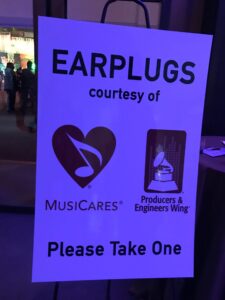
Going to South by SouthWest 2017?
MusiCares offers Free Hearing Test Sessions + Custom Hearing Molds Sessions all week
See Schedule Here

